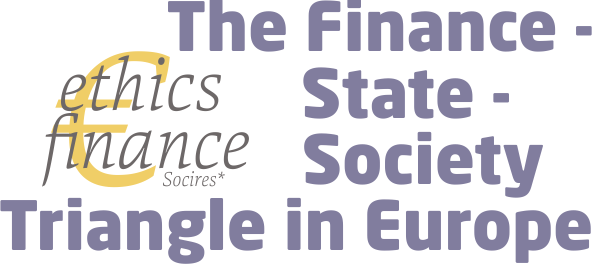The Finance – State – Society Triangle in Europe
The past and the next forty years
International Conference at the Vrije Universiteit, Amsterdam
 Date: 23 January 2018, Vrije Universiteit, Amsterdam
Date: 23 January 2018, Vrije Universiteit, AmsterdamDownload the Reader for this conference →
This conference is hosted by VU—Goldschmeding Chair and organized by Socires in co-operation with Moral Markets | Templeton World Charity Foundation



← Program | ← Workshops | Theme
About this conference

The financial crisis was not caused by the financial sector alone. This crisis, or rather our current situation, is the outcome of a process that was fuelled also by the state and by society as a whole. The origins of this process lie far back in time, yet it is evident that the process accelerated some forty years ago. If we restrict our history of the present to those forty years, it can indeed be ascertained that the relationships in the finance – state – society triangle have been altered drastically over this period of time. All three actors have changed and they have changed each other, in one single and ongoing process of complex transformation. The one concept to label this transformation is financialization. This process in turn is deeply connected to other far-reaching and accelerating changes, such as globalization, digitalization and virtualization.
Analyses of the financial crisis have commonly identified the practices of the financial sector as its main cause; and it is indeed an undeniable fact that much has gone wrong here. Following these analyses, strong disciplinary measures were enforced to keep the sector in check; and these interventions surely have had beneficial effects on the sectors’ health. However, this policy has now reached its limits and has come to generate adverse results for both the sector itself and the society that it serves. After all, society now has to cope with a handicapped service provider when it comes to financial issues.
Furthermore, the actual root causes of the financial crisis have not been addressed by those policies. If we agree that our current situation is the outcome of one single process in which the financial sector, the state and society all played their part and in which they themselves and their relationships were transformed; and if we agree that this outcome is undesirable because it is full of economic and societal risks for the future;
» then we must also agree that a possible way out can only be explored when based on a shared analysis and understanding of our common history of the present and on a shared commitment to making an effort to reorient the process in the desired direction. This should and can only be a shared effort of the financial sector, state and society.
No one actor can bring about fundamental change, nor can change itself without risking its survival. Change can only be the outcome of commitment by the collective of decisive stakeholders reached at in an ongoing dialogue in which they together enact or generate a shared purpose. Only in dialogue, and along the road, these stakeholders generate the mindsets and trust that are needed to come to mutual commitments for collective action for change.
Working hypothesis for the international conference 23 January 2018
The purpose of this program is to promote an informed conversation on the possibilities for a triangle arrangement finance-society-state at the European level. Underlying is a twofold premise:
• change in the financial system cannot be decreed or enacted by any one of the concerned stakeholders of the triangle – bankers, (institutional) investors, companies, politicians, public officers, policy advisors – but can only be the outcome of agreements and commitments by the collective of these decisive stakeholders reached at in an ongoing conversation in which they generate a shared purpose;
• the optimal geographic scale to start this conversation is the old Rhineland’s Europe, i.e. Benelux, France, Germany and Austria.
The question that will guide the international conference is the following:
» is it useful (deemed possible, realistic, feasible) to explore the perspectives for a proper European arrangement between the financial sector, state and society?
A proper European arrangement, both referring to its origin and features, and in the sense of distinct and relatively autonomous from the present, financialized and Anglo-America dominated global arrangement. That is, a European arrangement in which transactions are not impersonal and steered by systemic force but embedded in social relationships of trust and shared responsibility. Is this mere utopia? Or: how could it look like? How could it be brought about? What would be the first step and how could it be made to function and flourish?
In the run-up to this conference, two high level seminars were held in The Netherlands, in January and in June of 2017, with speakers and participants form the financial sector, politics, business, academy and civil society. The seminars were chaired by former Dutch Prime Minister prof. Jan Peter Balkenende and prof. Hans Schenk, Crown member of the Dutch Social and Economic Council. One point of reference for the seminars was the excellent report ‘ Balancing society and the financial sector’ by the Dutch Scientific Council for Government Policy, expounded by its main author, prof. Arnoud Boot.
Both seminars, under Chatham House rule, addressed the following three questions:
• How have we – financial sector, government, academy, companies and households; in short, our society – come to the current situation? i.e. reviewing our history of the present.
• How do we assess our current situation with a view to the future, in its structural, societal, cultural and ethical dimensions?
• Can this ongoing process be reoriented?
The main recommendation that came out of these seminars was that the experience should be repeated at an international level, involving representatives from relevant like-minded countries such as Germany, Belgium, Luxemburg, France and Austria. These countries were selected because supposedly they share a Rhenish legacy – though it should be stressed that this conference is not about restoring it!
Thus, the conference will address the triplet: history of the present - our current situation - possible reorientation with a view to establish the usefulness of exploring the perspectives for a proper European arrangement between the financial sector, state and society. Not less, and not more. It is expressly not the idea to come up with solutions or to design possible new arrangements. Solutions, new arrangements or institutions can only be viable if they are the outcome of a process in which the concerned parties willingly agree to give up part of their autonomy for a collective effort for a shared purpose, i.e. based on trust – and that is precisely where financialization comes in the way.
The outcome of the 23 January conference and its follow-up
As the nature of the conference is an open conversation on the usefulness of exploring the idea of a proper European financial-societal arrangement, its outcome cannot be predicted. Ideally, the outcome is that participants agree that indeed it is useful to further explore this idea and to commit themselves to at least two next steps: 1. to further the process in their home-country and 2. to participate in the follow-up international conference, to be held at the end of 2018, in Amsterdam or elsewhere.
The conference report that will be published by Amsterdam University Press.
